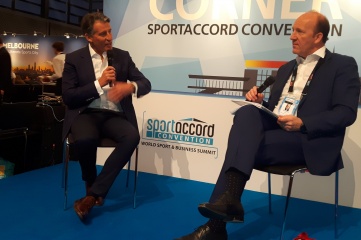IAAF president Sebastian Coe believes the creation of the new independent Athletics Integrity Unit (AIU) will not just benefit competitors but also puts policies in place to combat any threat to the sport’s ethics.
Launched at the SportAccord Convention, the AIU will be chaired by David Howman and replaces the IAAF’s former anti-doping department. It will manage activities including education/prevention, testing, intelligence gathering, investigations, results management, prosecutions and appeals.
The AIU’s focus will not only be on anti-doping but will also address integrity breaches in other areas of concern such as bribery and corruption, betting, the manipulation of competition results, age manipulation and misconduct around transfers of allegiance.
Coe said that from now on athletes must be the centre of the sport and the framework for the AIU will provide them with a “safer ecosystem”.
“At the heart of the governance reform is the creation of the Athletics Integrity Unit,” said Coe. “So often the athlete has been the first thought, but actually in reality the last consideration. This will place the athlete absolutely at the centre of that ecosystem. So they are the first thought and also the first consideration.
“It [the AIU] will have a very different approach to anti-doping. It will be independent, will remove national interest and will speed up the process. We need to resolve these issues quickly, we need to resolve them in an independent way and we need to do them so we don’t have national interest obscuring that process.”
Coe added: “It’s really important in a sport that has 214 federations that the ultimate goal is not just to make your headquarters safer or the academic process of putting corporate governances in place. They have to have practical applications through area associations, in our case the continental associations, and then it’s got to have an alignment, an impact and practical support to the 214 federations.
“This will take time but we needed a constitution that was both fit for purpose and can deal with not just one or two issues but for the first time we will have a unit that can deal with all these problems.
“Yes there is a disciplinary element to it, yes there is a sanctioning element to it, there will be investigative powers – but it is fundamentally there to help the athlete make the right decisions throughout their career.”
With the launch of the AIU, the sport is putting systems in place to safeguard its future off the track. But with the introduction of events such as Nitro Athletics, Coe says that innovation must also happen on the track if the sport is to survive.
Not seen as an event for the purists, Nitro Athletics was headlined by sprint king Usain Bolt and is a team-based competition that combines strength, endurance, power and extreme energy.
What did Coe think about the Nitro Athletics spectacle held in Melbourne in February? “It’s very simple, you innovate or you die,” he said. “If sport is our activity then our business is entertainment. We haven’t adapted [to the modern world] as well as we should have done.
“What I liked about Nitro is it’s not that you are suddenly in the World Championships in London or the [Olympic] Games in Tokyo going to see elimination miles, power plays or mixed relays, but there were clues there as to why young people felt more engaged in what they were watching.
“I did throw down the challenge when I became president to ‘do things differently’. It’s important that we evolve and it’s important that we engage young people.
“Yes, sometimes that will be uncomfortable for the purists.”


